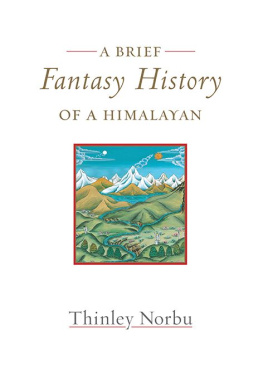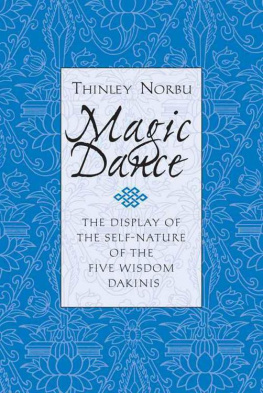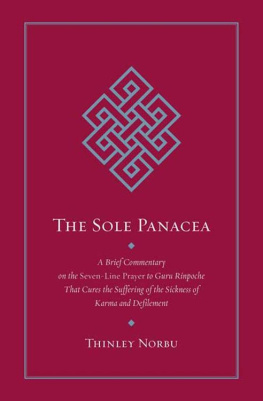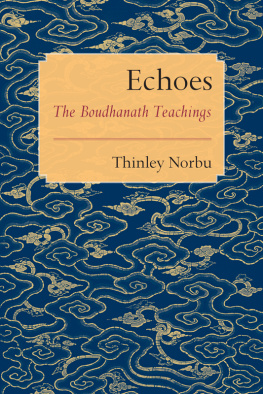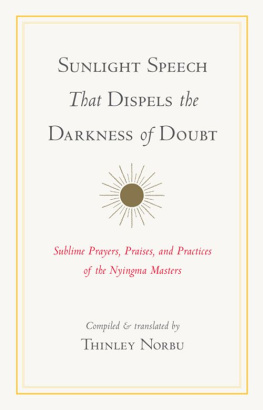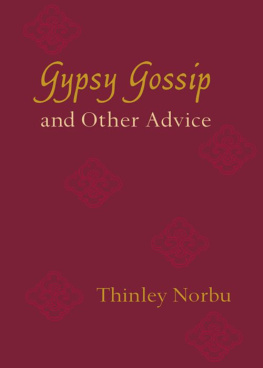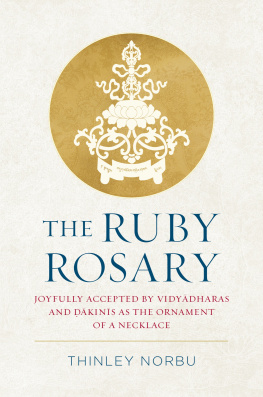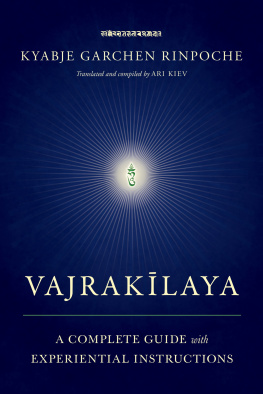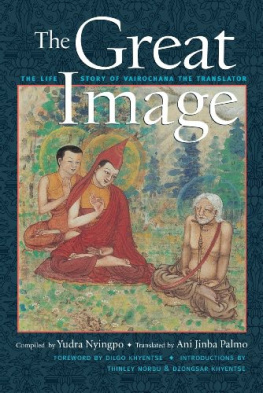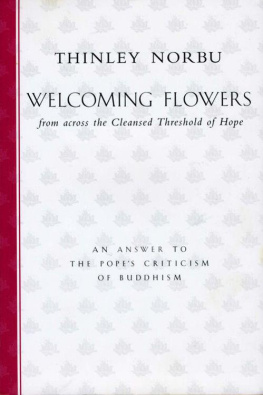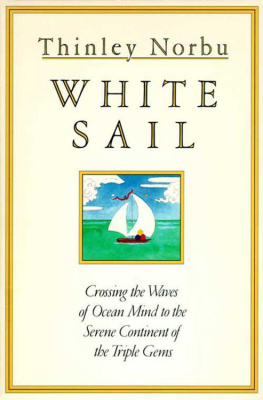ABOUT THE BOOK
In this autobiographical narrative, Kyabje Thinley Norbu Rinpoche sets a magical scene as he describes his early years in Snowland (Tibet) as one of seven children of the renowned Nyingma master Kyabje Dudjom Rinpoche. After touching on his youthful training and experiences, Rinpoche describes how he traveled and taught in many different nations and cities in the East and West. Shifting between poetic observations and earthy humor, he shares stories of worldly and spiritual events accompanied by incisive commentary and sublime prayers.
Rinpoches stories give readers an appreciation of the qualities of faith, respect, and commitment that he so beautifully embodied and strove to transmit. Moreover, they impart some of his most direct and trenchant instructions on the view of Buddhism and on what practitioners generallyand Western ones in particularneed to do in order to accomplish the goal of the Buddhist path. His sometimes provocative teaching style is an expression of the deep kindness with which he regarded his students.
The narrative is brought to life visually with many rare personal color photos of Rinpoche, his teachers, his family, and the places he lived. Much more than a memoir, this book is an articulate expression of Thinley Norbus incisive wisdom and profound compassion.
THINLEY NORBU RINPOCHE (19312011) was a preeminent teacher in the Nyingma school of Tibetan Buddhism. The eldest son of His Holiness Ddjom Rinpoche, he was a primary holder of the Ddjom Tersar lineage and considered to be an emanation of Longchenpa, the great fourteenth-century Nyingma master.
Sign up to receive weekly Tibetan Dharma teachings and special offers from Shambhala Publications.

Or visit us online to sign up at shambhala.com/edharmaquotes.
A Brief
Fantasy History
OF A HIMALAYAN

Autobiographical Reflections
T HINLEY N ORBU

S HAMBHALA
Boston & London
2014
SHAMBHALA PUBLICATIONS, INC.
Horticultural Hall
Massachusetts Avenue
Boston, Massachusetts 02115
www.shambhala.com
2014 by the Estate of Kyabje Thinley Norbu Rinpoche
Cover art by Ngawang C Sherpa
All rights reserved. No part of this book may be reproduced
in any form or by any means, electronic or mechanical,
including photocopying, recording, or by any information storage
and retrieval system, without permission in writing from the publisher.
LIBRARY OF CONGRESS CATALOGING-IN-PUBLICATION DATA
Thinley Norbu, author.
A brief fantasy history of a Himalayan:
autobiographical reflections / Thinley Norbu.
pages cm
ISBN 978-1-61180-205-4 (hardback)
eISBN 978-0-8348-2989-3
1. Thinley Norbu. 2. Buddhist monksBiography. I. Title.
BQ990.H55T55 2014
294.3923092dc23
[B]
2013048264
NOTE TO THE READER
I N HIS BOOK The Small Golden Key, Kyabje Thinley Norbu Rinpoche related: I wrote A Brief Fantasy History of a Himalayan in the countryside of New York in the springtime amid swaying weeping willow trees because some of my loving American friends requested me to tell my life history. They helped me through their fanatical, positive hallucination phenomena toward me and my speech which is like brass, but which they saw like pure gold and tried to make as an ornament for the Buddhas teaching.
The writing was begun in 1980, but Rinpoche did not want to publish it until making additions about his later years. Although a few inserts were added in the 1990s, Rinpoche did not get to finish this book as he had wished; however, he continued writing other books that he considered to be more important for the benefit of others. Rinpoche was never concerned about anything to do with himself. Yet this brief book is actually very important for others, because it gives some details of Rinpoches life never recounted anywhere else, and especially because it allows us a glimpse of the inconceivable selfless nature of this buddha who appeared in the world only for others, quietly teaching and showing through his extraordinary kindness and his completely pure, profound example how to practice in a simple way and how to open to wisdom. Like everything written by Rinpoche, it is a guide to enlightenment.
In this new edition, for the convenience of interested readers we have added a section in the back giving the Tibetan, English, or Sanskrit equivalents for selected names, titles, and terms.

E VERYTHING IS FANTASY CREATED BY ILLUSORY MIND
Everything is fantasy contained within illusory mind
The eternalist view is fantasy to the nihilist
The nihilist view is fantasy to the eternalist
Both views are fantasy to the Buddhist
The past is fantasy since we cant see it now
The future is fantasy since we cant use it now
The present is fantasy since we cant find it now
If everything is fantasy, this history is also fantasy
If everything is true, this history is also true
So, may you, Lord Buddha, most sublime fantasy
Bless this short fantasy history
Which my fantasy friends asked me to write
For the benefit of all sentient being fantasizers
M Y FATHER IS THE EMANATION OF Blood-Drinking Islander, Subduer of Evil. In sublime histories, Blood-Drinking Islander is described as very wrathful, radiant, and splendid, with a fierce white beard and piercing eyes. He wore spiral conch shell earrings and dressed in the ancient, snow mountain great yogis style. His hair was tied up at the top of his head in a knot, symbolic of abiding in the great samadhi of Mahasandhi, with the rest loose and uncontrived by worldly custom; his clothes were white and uncontrived by other colors; and his unending natural mind was self-liberated and uncontrived by dualistic thoughts. He received teachings on the alphabet and language from beings with ordinary human form visible to general perception, but mostly he received wisdom transmissions from sublime beings through his personal pure perception of visions invisible to others. He kept a sky-iron kilaya symbolic of the four great wish-fulfillments, and tucked in his sash a sword symbolic of the wisdom weapon, and sometimes, when exorcising possessed beings, he would hit them with a ferocious strike of the back of the sword. Everyone was terrified of his fierce nature. He was always subduing demon-minded beings through his wrathful compassion.
Before his death he said to his disciples, Now it is the unlucky degenerate age and there will be war with the enemies of Buddhism, so we should go to the Hidden Land of Lotus Ornament blessed by Padmasambhavas sunlight feet. You go before me. I am an old man and I will follow slowly after you. Then many disciples left their country for the Hidden Land of Lotus Ornament, but before most of them reached their destination, he had passed into his next emanation form.

Dudjom Lingpa (Blood-Drinking Islander, Subduer of Evil).
My fathers name is Fearless Wisdom Vajra. He was born east of the Himalayas in the Hidden Land of Lotus Ornament, as his previous incarnation had predicted. His mothers family came from Dragonland. When he was young, because of his graceful, androgynous appearance, it was sometimes difficult for strangers to recognize whether he was a man or a woman. He had long hair that was sometimes left loose and sometimes plaited, and he wore clothes in the Snowland ordinary yogis style, except during special ceremonies when he dressed according to the Vajrayana custom. He had many sublime teachers, including Empowered Changeless True Meaning, his previous incarnations disciple, who recognized him in this next incarnation. Extraordinarily gifted, he has organized many texts of treasure holders, especially those of his previous incarnation. From the time he was a teenager, profound hymns and songs came to him naturally that awakened readers like the self-sounding of Dharmata. The fingers of old intellectual scholars could not write meaningfully in this way even with their pens aimed in tight concentration just like seagulls waiting at the shore for fish who rarely come. He has written many shastras and given initiations and tantric teachings up to the Great Perfection. His disciples include a great variety of scholars, monks, nuns, laypeople, yogis, yoginis, and lamas, and cannot be numbered. Everyone is spoiled by his gentle nature, and he is always blessing fortunate beings through peaceful compassion and subduing demon-minded beings through exposing their dormant evil qualities. He has no certain, definite ideas, so he just echoes other beings demands and desires. He has no self-grasping judgment, so many self-seeking beings often misuse him as capital for their own self-promotion, just as there are many beings surrounding the Gandhola of Bodh Gaya and the Stupa of Boudhanath who do not have even one iota of faith, but are relying on these stupas to do their business.
Next page
